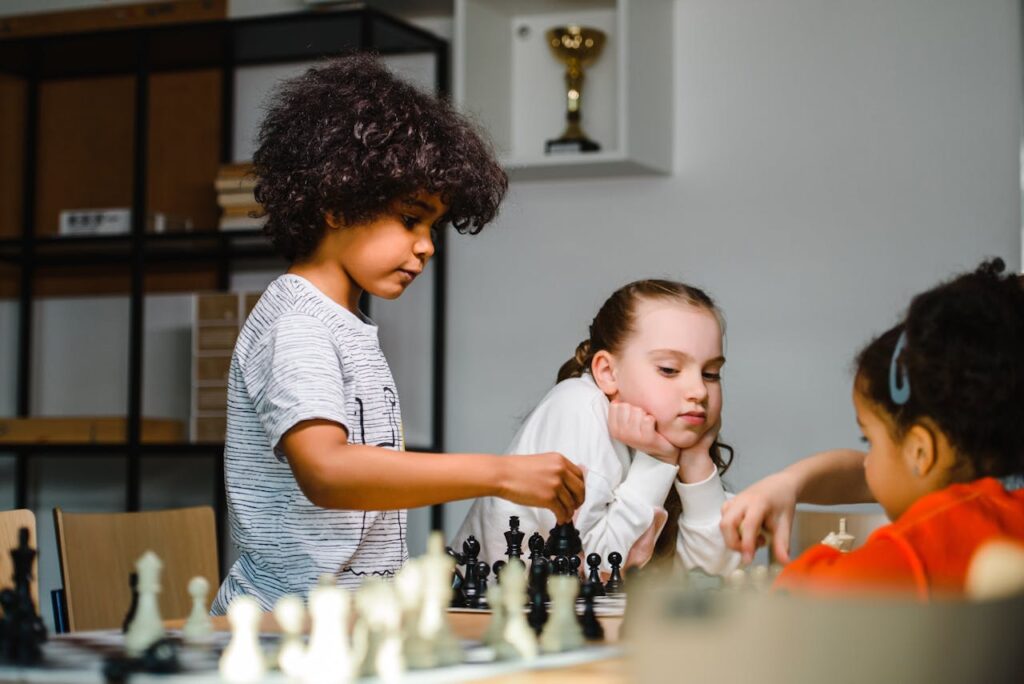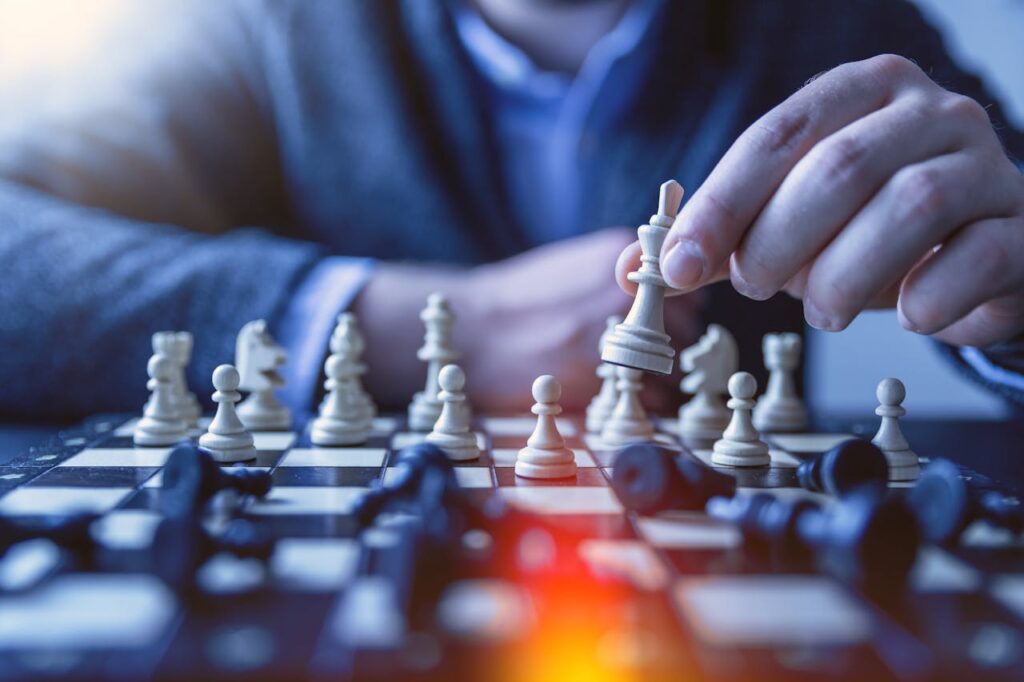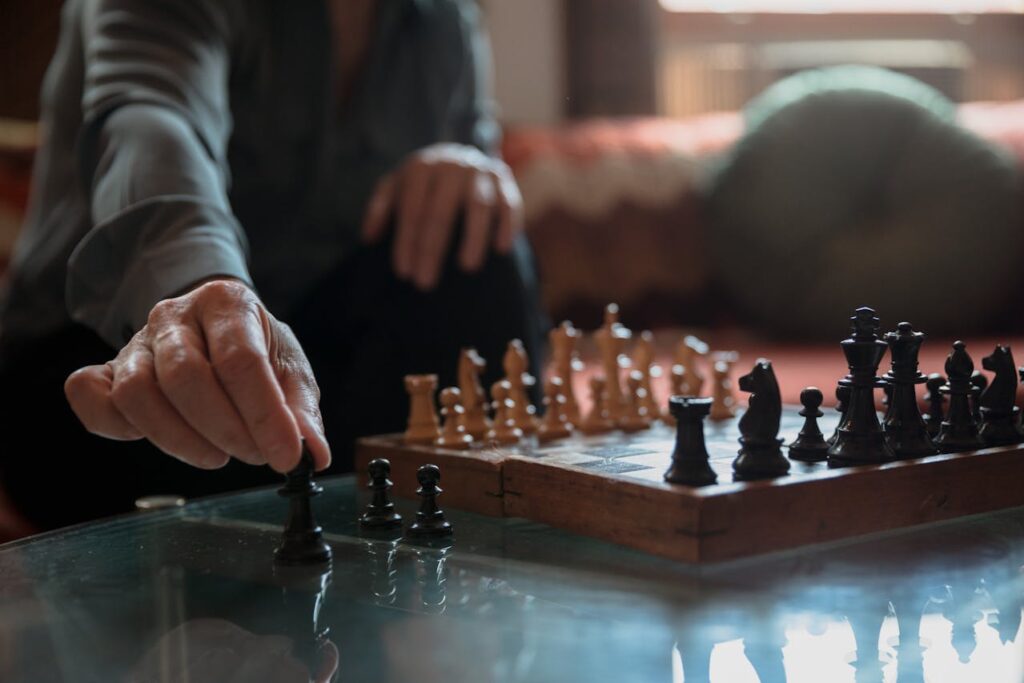Chess is a timeless game that has been enjoyed by people of all ages for centuries. But for kids, it’s more than just a game—it’s a fun and engaging way to learn strategy, develop critical thinking skills, and boost confidence.
Teaching children to play chess introduces them to a world of strategic decision-making that is both challenging and rewarding. While the game may seem complex at first, kids quickly pick up the rules and start to experience the excitement of planning their next move and outsmarting their opponent.
Why Chess is Great for Teaching Strategy
Chess is often called the “game of kings” because it requires careful thought, planning, and foresight. Unlike games of chance, where luck plays a role, chess is entirely about strategy.
Every move a player makes impacts the next, which teaches kids to think ahead and consider the consequences of their actions. This makes it one of the best ways for children to develop a strategic mindset.
Developing Critical Thinking Skills
When kids play chess, they quickly learn that each move matters.
These decisions require deep thought and analysis, as players must consider not only their current move but also anticipate their opponent’s response.
For example, if a child moves their queen too early in the game, they may quickly realize that it’s vulnerable to attack.
After losing the queen a few times, they begin to understand the importance of timing and piece coordination.

Chess teaches kids to evaluate different options, consider possible outcomes, and choose the best course of action.
This kind of thinking improves their problem-solving skills, both on and off the chessboard.
Encouraging Long-Term Planning
One of the key elements of strategy in chess is long-term planning. A chess game is not won in a single move. To succeed, players must develop a plan, stick to it, and adjust as the game progresses.
This helps children understand the value of patience and persistence—two essential traits for success in life.
For example, if a child wants to checkmate their opponent’s king, they have to set up their pieces carefully, sometimes over many turns.
They learn to be patient, knowing that rushing their strategy could lead to mistakes.
This ability to focus on long-term goals, rather than immediate gratification, is an important life skill that chess helps develop.
Learning from Mistakes
Chess is also a great way to teach kids how to learn from their mistakes.
In every game, players make moves they later regret—whether it’s moving a piece too early, missing an opportunity, or failing to see an opponent’s strategy.
The key to improving in chess is recognizing these mistakes, analyzing them, and figuring out how to avoid them in the future.

This reflective process encourages children to see mistakes not as failures but as opportunities for growth.
If a child loses a game, they can review the match, understand where they went wrong, and use that knowledge in their next game.
This builds emotional resilience and a growth mindset, teaching kids that improvement comes from learning and persistence.
How Chess Builds Key Skills While Having Fun
For many kids, chess is more than just a game—it’s an adventure where each move is a new challenge to overcome.
The beauty of chess is that while children are focused on the excitement of the game, they are simultaneously developing essential life skills.
Boosting Memory and Concentration
Playing chess requires players to remember the positions of their pieces, think about previous moves, and recall strategies that have worked in the past. In short, it’s a mental workout that strengthens memory.
The more children play, the better they become at remembering patterns, recognizing opportunities, and anticipating their opponent’s strategy.
For example, many kids quickly learn to recognize common openings, such as the “Ruy-Lopez” or “Queen’s Gambit,” just from memory.
As they practice more, they begin to remember the best responses to these moves. This memorization helps them make quicker and more confident decisions.
Promoting Creativity and Imagination
Chess is not just about following rules and moving pieces mechanically. It’s also a game of creativity, where players can explore different strategies, take risks, and come up with new ways to solve problems.
Every move is a chance to be creative, especially when players face a challenging position. Finding unexpected solutions to difficult situations encourages kids to think outside the box.
For instance, when a child is in a tight spot, they might come up with a clever combination of moves to escape, turning a losing game into a potential victory.
This kind of creative problem-solving is fun for kids and helps boost their confidence in handling tough situations, both in chess and in real life.
Chess is a game where the possibilities are endless, and the more children play, the more imaginative they become.
They start seeing the game not as a series of mechanical moves but as an opportunity to explore different approaches, test new ideas, and make bold decisions.
Improving Decision-Making Skills
Every move in chess requires careful thought and decision-making. These decisions must be made quickly and under pressure.
Learning how to make these choices teaches kids the importance of evaluating different options and considering both short-term and long-term consequences.

For example, a child may be tempted to capture an opponent’s piece but must think about how that will affect their overall position on the board. Is it worth it to trade a knight for a bishop?
Will capturing the piece open up vulnerabilities for a counter-attack? By thinking through these scenarios, kids develop the ability to make thoughtful, informed decisions.
Teaching Accountability and Responsibility
Chess is a game where every player is responsible for their own moves. There are no teammates to blame if something goes wrong, and no lucky dice rolls to depend on.
This means that children must take full responsibility for their actions on the chessboard.
If a child loses a game, they can’t blame anyone else; instead, they must reflect on their own choices and learn from them.
This teaches kids the importance of accountability and taking ownership of their decisions.
It also helps them understand that they have control over the outcomes they experience, both in the game and in life.
How to Introduce Chess to Kids: Making It Fun and Accessible
Now that we’ve explored how chess can help children develop critical skills while having fun, you may be wondering how to introduce this game in a way that is engaging and enjoyable.
The key is to make the learning process simple, interactive, and focused on fun rather than competition.
Start with the Basics
When introducing chess to children, it’s important to start with the basics.
Teaching them all the rules at once can feel overwhelming, so it’s helpful to break the game down into small, manageable lessons.
Start by explaining how each piece moves—one at a time. You might begin with the pawn, explaining how it moves forward but captures diagonally.
Once your child understands the pawns, move on to the rook, knight, bishop, and eventually, the queen and king.
For example, you could turn the learning process into a fun game itself. Have your child practice moving one piece around the board, setting up little challenges.
These small exercises build familiarity with each piece and create a sense of accomplishment as kids master the different movements.
Play Together—Without Pressure
One of the best ways to teach chess is by playing with your child. This not only gives them a chance to practice but also allows you to explain strategies and offer guidance as you play.
Keep the mood light and fun. Don’t worry about who wins—focus on having a good time and helping your child learn.
While playing, try to explain your thought process to your child. For example, if you move a piece, say out loud, “I’m moving my knight here because I want to protect my queen.”
By thinking aloud, you help your child see the reasons behind each move and begin to understand the strategic depth of the game. Over time, they will start applying similar thinking to their own moves.

Incorporate Chess Puzzles and Challenges
Once your child is familiar with the basic movements of the pieces, you can introduce chess puzzles. These are pre-set positions where the goal is to find the best move.
Puzzles are a fantastic way for kids to practice strategic thinking in bite-sized chunks, and they’re also fun to solve.
Chess puzzles often focus on specific themes like checkmates, forks, or pins, and they help kids improve their tactical skills without the pressure of playing a full game.
Many online resources and apps offer daily chess puzzles that challenge kids to think critically and find creative solutions.
Join a Chess Club or Play Online
Once your child feels confident in their skills, you might want to explore other ways to engage with the game.
Chess clubs offer a great opportunity for kids to meet other players, practice their skills, and learn from others.
Many schools have chess clubs, and there are also local community clubs that welcome beginners.
Playing chess online is another option. Many platforms allow kids to play against others from around the world or practice against computer opponents.
Online chess also offers features like tutorials, puzzle-solving challenges, and feedback on moves, making it a great way to continue learning.
How Chess Teaches Life Lessons Through Fun
Chess is not only a game that builds cognitive skills—it also offers valuable life lessons that children can carry with them into adulthood.
The strategic thinking, patience, and decision-making that chess teaches are skills kids can apply to various aspects of their lives.
Patience is Key
In chess, rushing to make moves usually leads to mistakes. A successful player must take their time to analyze the board, consider different possibilities, and plan a strategy.
This need for patience is one of the most important lessons chess teaches children.
In today’s fast-paced world, where everything seems to happen quickly, learning to slow down and take thoughtful actions is a rare and valuable skill.
For example, if a child learns to play chess, they soon understand that impulsive decisions can lead to losing key pieces or even the entire game.
They realize the value of waiting for the right moment to make a move and that sometimes doing nothing (or holding off) is better than acting too soon.
This sense of patience is crucial not only in chess but in many other areas of life, like dealing with challenges, resolving conflicts, or working through long-term projects.
Learning to Make Trade-Offs
Another valuable lesson that chess teaches is the importance of making trade-offs. In chess, players often have to sacrifice a piece to gain a better position or set up a long-term strategy.
For example, giving up a pawn to capture a more valuable opponent’s piece like a rook or queen is a common and necessary tactic.
Chess teaches kids that in both games and life, achieving success often requires giving something up to gain something more valuable.
Children who play chess develop a deeper understanding of how to weigh pros and cons, a skill that’s essential when making real-life decisions.
Whether they are deciding how to spend their time, choosing which activities to focus on, or managing their priorities, the ability to evaluate trade-offs and make informed choices helps kids become more responsible decision-makers.
Handling Stress and Pressure
Chess is also a great way to teach children how to handle stress. Every chess game comes with moments of pressure, where one wrong move could lead to a significant disadvantage.
This experience of being in high-pressure situations—whether it’s trying to avoid checkmate or deciding on a critical move with the clock ticking—teaches children how to manage their emotions and think clearly even when they’re feeling anxious.
When kids play chess, they often find themselves in situations where they must make a quick decision under time constraints or when the stakes are high.
This practice helps children become more comfortable with stress, learning to breathe, think clearly, and make the best possible decision under pressure.
This skill is invaluable in daily life, whether it’s handling exams, participating in sports, or facing social challenges.
Accepting Consequences and Accountability
One of the most powerful lessons chess teaches is accepting responsibility for one’s actions. In chess, every move is a player’s choice, and every choice comes with consequences—good or bad.
If a child makes a poor move, they have to deal with the outcome. There’s no one else to blame, and there’s no luck involved. It’s all about personal decisions.
This direct relationship between action and consequence helps children develop a sense of accountability.
They learn that they are in control of their decisions and must accept the results, even when things don’t go as planned.
If a child loses a game, they can’t attribute the loss to bad luck—they must look at their own choices and figure out what went wrong.
Making Chess a Lifelong Skill
One of the most wonderful aspects of chess is that it’s a game for life. Once a child learns how to play chess, it becomes a skill they can enjoy at any age.
Chess offers endless possibilities for growth, as there is always something new to learn, whether it’s a new opening strategy, a clever tactic, or an advanced endgame technique.
Chess as a Family Activity
Chess is a great way for families to bond. Whether parents are seasoned players or learning alongside their children, playing chess together can be a fun and enriching activity for everyone.
Family chess nights are an excellent way to spend quality time together while also helping children improve their skills in a supportive, low-pressure environment.

For example, setting up a regular chess game once a week can create a family tradition where everyone looks forward to the fun and learning experience.
Parents can share their own strategies or let their kids explain their thought process for making certain moves, fostering communication and teamwork.
Keeping the Learning Process Fun
It’s important to keep the chess learning process fun and engaging for kids. While it’s a game of skill and strategy, chess should never feel like a chore.
When kids feel excited about learning new tactics or mastering a strategy, they are more likely to stay engaged and motivated.
To make chess enjoyable, incorporate storytelling and imagination into the game.
For younger children, you might describe the pieces as characters with personalities—knights as brave warriors, rooks as towering castles, and queens as powerful leaders.
This makes learning chess feel like an adventure, encouraging kids to immerse themselves in the game.
Conclusion
Chess is far more than just a board game—it’s a tool that teaches kids valuable life lessons, all while keeping them engaged and entertained.
By playing chess, children develop critical thinking skills, learn to plan ahead, and boost their creativity.
It helps them improve their memory and concentration while also teaching them patience, persistence, and how to handle pressure.
Through its simple yet profound lessons, chess becomes an enjoyable way for children to understand the importance of strategy, decision-making, and accountability.
The beauty of chess is that every child can learn and grow at their own pace. Whether playing at home with family, joining a local chess club, or solving puzzles online, there are endless opportunities to explore the game and its strategies.
Most importantly, chess teaches children to embrace mistakes as learning opportunities, fostering a growth mindset that will serve them well in all areas of life.
READ NEXT:
- How Chess Can Help Kids Handle Stress
- Why Chess is the Best Game for Young Minds
- The Power of Chess in Developing Decision-Making Skills
- How Chess Encourages Lifelong Learning in Children
- How Chess Can Improve Your Memory and Recall as an Adult
- Chess for Adults: A Fun Way to Boost Mental Acuity
- How Chess Builds Mental Toughness in Adults

